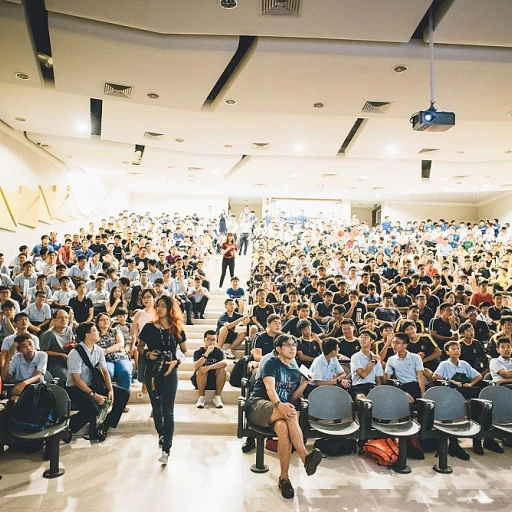
Understanding AI in Employee Development
AI's Role in Shaping Employee Development
Artificial intelligence is revolutionizing the landscape of employee development by offering data-driven insights and personalized coaching tailored to individual needs. As organizations strive to keep pace with evolving business environments, AI's capabilities in understanding and bolstering employee skills are becoming increasingly critical. The integration of AI in learning development presents unique opportunities for both employers and employees to enhance their performance and leadership potential. AI-powered platforms are tailored to facilitate continuous learning, offering personalized training modules that are adjusted in real-time based on employee performance and feedback. These tools support talent development by offering a bespoke coaching experience that aligns with specific career objectives. This targeted approach not only boosts employee engagement but also fosters a culture of continuous improvement. Moreover, AI's incorporation into employee development allows organizations to efficiently manage leadership development initiatives. By leveraging AI's analytical capabilities, companies can gain a comprehensive view of performance management processes, track progress, and identify areas for growth. Organizations adopting AI coaching platforms can expect significant improvements in performance reviews and talent management. These advancements are driven by real-time data and insights that enable more informed decision-making and effective change management strategies. For more in-depth insights on enhancing change management processes through AI adoption, explore our resource on effective process evaluation.Benefits of AI Coaching for Change Management
Embracing Data-Driven Coaching for Organizational Success
Integrating AI coaching into change management can remarkably enhance the development process for employees and organizations. This powerful tool focuses on data-driven solutions that support employees in their growth journey, leading to improved performance management.
First, data and analytics from AI platforms enable personalized learning experiences that bolster performance reviews. AI harnesses real-time data to offer feedback that is not only constructive but also immediate. It prompts behavior change and fuels leadership development through insights derived from analytics.
- Efficient Time Management: AI coaching automates many aspects of employee development, providing significant time savings for both managers and employees.
- Enhanced Employee Engagement: Engaging tools within AI platforms keep employees motivated, providing a new dimension to traditional employee development and talent management.
- Improved Feedback Mechanisms: In today’s corporate training landscape, feedback systems powered by AI drive continuous improvement.
- Accelerated Talent Development: AI coaching actively identifies and nurtures talent, aiding in bespoke leadership training.
Empowerment through tools like AI platforms ensures that employees have access to cutting-edge resources that aid in their work performance. Moreover, such platforms support the holistic development of personnel, touching upon not just professional goals but sometimes enhancing aspects like physical health.
As organizations embrace AI as a vital part of change management, it's crucial to recognize its role in broadening the horizons of talent development and ensuring that coaching leadership remains relevant and impactful. For a deeper understanding of strategic enhancements, refer to enhancing military strategies through continuous improvement and how it parallels organizational growth.
Challenges in Implementing AI Coaching
Overcoming Hurdles in AI Coaching Implementation
Implementing AI-driven coaching programs within organizations is not without its obstacles. While the benefits have been outlined in previous sections, such as enhanced performance and leadership development, one must also consider the challenges that lie ahead.- High Initial Investment Costs: Incorporating AI platforms for employee development requires significant upfront investment in technology and infrastructure. This includes setting up the necessary data-driven tools and coaching platforms capable of providing personalized learning experiences.
- Data Security Concerns: Handling sensitive employee data brings about privacy concerns. Organizations must ensure that their AI systems comply with data protection regulations and maintain trust through secure data management practices.
- Integration with Existing Systems: AI coaching tools need to seamlessly integrate with existing talent management and performance review systems. This can often be a complex process, requiring thorough planning and cross-departmental collaboration.
- Resistance to Change: Employees and management may be hesitant to adopt new AI-based learning development systems, especially if they are accustomed to traditional methods like physical health sessions and in-person training. Encouraging behavioral adaptation requires change management strategies, as highlighted in this resource.
- Lack of Expertise: Organizations may face a skills gap when it comes to effectively managing AI coaching platforms. Leadership must invest in capacity building to ensure there is internal expertise available to manage and analyze the AI-powered performance data.
- Ensuring Quality and Relevance: To truly engage employees, coaching programs must offer real-time feedback and remain relevant to current work demands. This can be achieved through continuous monitoring and updating of AI-driven content.
Evaluating the Effectiveness of AI Coaching
Measuring Progress and Ensuring Impact
Evaluating the effectiveness of AI coaching within employee development is crucial for organizations looking to yield tangible improvements in employee performance. This involves assessing not just the immediate outcomes of AI-powered coaching platforms, but also their long-term impact on organizational goals.
Data-Driven Insights
AI solutions offer a wealth of data that organizations can use for performance management and enhancement. By leveraging this data, companies are better able to understand how training and development initiatives translate into real-world results. Monitoring behavior change and employee engagement becomes more straightforward with these structured tools that offer insights in near real time.
Feedback Mechanisms
Integrating AI with existing employee performance and development frameworks provides personalized feedback that can be pivotal for employees. Such feedback facilitates targeted learning development and offers practical avenues for skills enhancement. The continued refinement of these systems aids in fostering an environment where talent development thrives.
Assessing Employee Engagement
The effectiveness of AI coaching is also apparent in its ability to enhance employee engagement. Through structured coaching, employees are more likely to feel invested in their roles, which, in turn, boosts overall performance reviews and talent management systems. This connection between AI and engagement underscores the vital role of supportive coaching leadership.
Refinement through Continuous Review
Continuous assessment cycles are essential. These evaluations rely heavily on AI-driven insights to inform leadership development strategies and improve physical health and team-based dynamics. The inclusion of AI in performance review processes also aids in distinguishing between genuine skill improvements and areas needing further attention.
By focusing on key performance indicators and leveraging AI tools, companies ensure that the deployment of AI coaching translates into meaningful progress. Personalized learning pathways created through AI serve as both a reflective and actionable measure of success.
Case Studies: Success Stories with AI Coaching
Real-World Applications of AI Coaching
Organizations across various sectors are increasingly adopting AI-powered coaching platforms to enhance employee development and performance management. These tools are transforming traditional methods by offering personalized learning experiences and real-time feedback, which are crucial for effective talent management.
Boosting Employee Engagement and Performance
One notable example is a multinational corporation that integrated AI coaching into its leadership development programs. By leveraging data-driven insights, the company was able to tailor training sessions to individual needs, significantly improving employee engagement and performance reviews. The AI platform provided continuous feedback, allowing employees to adjust their behavior in real time, leading to measurable improvements in performance.
Enhancing Leadership Development
Another success story comes from a tech company that used AI coaching to support its leadership development initiatives. The AI tools helped identify potential leaders by analyzing employee performance data and offering targeted coaching to develop necessary skills. This approach not only streamlined the talent development process but also ensured that the right employees were prepared for leadership roles, ultimately strengthening the organization's leadership pipeline.
Improving Corporate Training and Learning Development
In the realm of corporate training, AI coaching has proven to be a game-changer. A financial services firm implemented an AI-driven learning platform to enhance its training programs. The platform's ability to provide personalized learning paths and instant feedback enabled employees to learn at their own pace, improving both retention and application of new skills. This personalized approach to learning development has led to a more skilled and adaptable workforce, ready to meet the challenges of a rapidly changing business environment.
Transforming Performance Management Systems
AI coaching is also revolutionizing performance management systems. A healthcare organization adopted AI tools to facilitate more effective performance reviews. By using AI to analyze employee performance data, the organization was able to provide more accurate and constructive feedback. This not only improved employee performance but also fostered a culture of continuous improvement and development.
Future Trends in AI and Employee Development
Emerging Trends in AI and Development Practices
The landscape of employee development is constantly evolving, and artificial intelligence is playing an increasingly pivotal role in shaping future practices. The growing integration of AI in coaching and training platforms is not just a phase but an ongoing shift toward more personalized and efficient development programs.- Advanced Coaching Platforms: AI-powered coaching platforms are leaning towards more personalized learning experiences. These platforms can assess individual employee skills and provide tailored coaching strategies, allowing for effective leadership development and comprehensive talent management.
- Real-Time Feedback and Performance Management: As organizations focus on improving employee engagement, AI facilitates real-time feedback mechanisms that surpass traditional performance reviews. This dynamic approach aids in instant behavior change and continuous performance improvement.
- Data-Driven Insights: AI tools are enhancing decision-making processes within organizations by offering data-driven insights. By analyzing vast amounts of performance data, companies can refine their training methods, ensuring optimal employee development and alignment with corporate training objectives.
- AI Integration in Talent Development: Talent development initiatives are witnessing a transformation with AI integration. The ability to harness data and feedback allows talent management experts to identify potential leadership qualities early and nurture them through customized training programs.
- Focus on Inclusivity and Accessibility: AI is breaking barriers in training accessibility, ensuring that learning development is inclusive. This trend is vital for organizations focused on promoting equal opportunities and enhancing overall employee performance.













